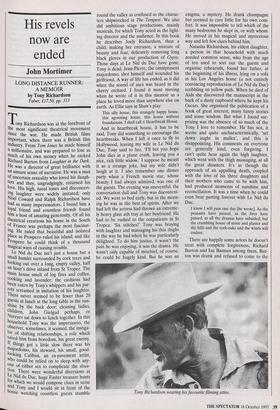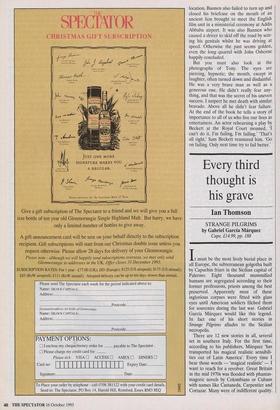His revels now are ended
John Mortimer
LONG DISTANCE RUNNER: A MEMOIR by Tony Richardson Faber, f17.50, pp. 313 Tony Richardson was at the forefront of the most significant theatrical movement since the war. He made British films important, when there was a British film industry. From Tom Jones he made himself a millionaire, and was prepared to lose as much of his own money when he sacked Richard Burton from Laughter in the Dark. He was a director of great brilliance with an unsure sense of narrative. He was a man of uncertain sexuality who loved his daugh- ters and they, ungrudgingly, returned his love. His high, nasal tones and disconcert- ing laughter were widely imitated; only Noel Coward and Ralph Richardson have had as many impersonators. I found him a loyal friend and countless friends found him a host of amazing generosity. Of all his theatrical creations his home in the South of France was perhaps the most fascinat- ing- He ruled that beautiful and isolated Place as Prospero ruled his island; and like Prospero he could think of a thousand magical ways of causing trouble. Le Nid du Duc isn't just a house but a small hamlet surrounded by cork trees and looking out over a long, empty valley, half an hour's drive inland from St Tropez. The main house smelt of log fires and coffee, been and lavender; the cushions had °een eaten by Tony's whippets and his par- rots screamed in imitation of his laughter. There never seemed to be fewer than 20 guests at lunch at the long table in the sun- shine by the back door; cleaning ladies, children, John Gielgud perhaps, or Nureyev sat down to lunch together. In this household Tony was the impressario, the observer, sometimes, it seemed, the instiga- tor of shifting relationships, a role which saved him from boredom, his great enemy. If things got a little slow there was his majordomo, his steward, his small, good- looking Caliban, an ex-pavement artist, who could be relied on to sleep with any- one of either sex to complicate the situa- tion. There were wonderful diversions at Le Nid du Due, huge Easter treasure hunts for which we would compose clues in verse and Tony and I would sit in front of the house watching countless guests stumble round the valley as confused as the charac- ters shipwrecked in The Tempest. We also did ambitious stage productions, mainly musicals, for which Tony acted as the light- ing director and the audience. In this book he describes Joely Richardson, then a child, making her entrance, a mixture of beauty and fear, delicately removing long black gloves in our production of Gypsy. Those days at Le Nid du Duc have gone; Tony is dead, Jean-Pierre, the omnipresent majordomo, shot himself and wounded his girlfriend. A way of life has ended, as it did when the sound of axes was heard in the cherry orchard. I found it most moving when he wrote of it in this memoir as a place he loved more than anywhere else on earth. As Ellie says in Shaw's play:
This silly house, this strangely happy house, this agonising house, this house without foundations. I shall call it Heartbreak House.
And in heartbreak house, it has to be said, Tony did something to encourage the heartbreaks. When I left it once to fly to Hollywood, leaving my wife in Le Nid du Duc, Tony said to her, 'I'll bet you hope John dies in a plane crash, leaving you a nice, rich little widow.' I suppose he meant it as a strange joke, but my wife didn't laugh at it. I also remember one dinner party when a French movie star, whose beauty I had always admired, was one of the guests. The evening was uneventful, the conversation dull and Tony was discontent- ed. We went to bed early, but in the morn- ing he was in the best of spirits. After we had left the actress had thrown an extreme- ly heavy glass ash tray at her boyfriend. He had to be rushed to the outpatients in St Tropez. 'Six stitches!' Tony was braying with laughter and massaging his thin thighs in the way he had when he was particularly delighted. To do him justice, it wasn't the pain he was enjoying, it was the drama. He wasn't only capable of mischief, of course, he could be hugely kind. But he was an enigma, a mystery. He drank champagne but seemed to care little for his own com- fort. It was impossible to tell which of the many bedrooms he slept in, or with whom. He moved in his magical and mysterious way and left few clues behind him.
Natasha Richardson, his eldest daughter, a person in that household with much needed common sense, who from the age of ten used to sort out the guests and organise rehearsals, found her father, at the beginning of his illness, lying on a sofa in his Los Angeles home (a not entirely convincing reproduction of Le Nid du Duc) scribbling on yellow pads. When he died of Aids she discovered the manuscript in the back of a dusty cupboard where he kept his Oscars. She organised the publication of a book of great interest, many funny stories and some wisdom. But what I found sur- prising was the absence of so much of the Tony I love to remember. He has not, it seems and quite uncharacteristically, 'set down aught in malice', and this is disappointing. His comments on everyone are generally kind, even forgiving. I can't quite hear again the high laughter, which went with the thigh massaging, at all the great disasters. It's as though the approach of an appalling death, coupled with the love of his three daughters and their mothers who came to be with him, had produced moments of sunshine and reconciliation. It was a time when he could even bear parting forever with Le Nid du Due.
I know I will pass one day [he wrote]. As the peasants have passed, as the fires have passed, as all the dramas have subsided; but the crumbling house of stone and plaster and the hills and the cork-oaks and the winds will endure.
There are happily some actors he doesn't treat with complete forgiveness, Richard Burton and Ian Bannen among them. Bur- ton was drunk and refused to come to the Tony Richardson wearing his favourite filming attire. location, Bannen also failed to turn up and closed his briefcase on the mouth of an ancient lion brought to meet the English film unit in a ministerial ceremony at Addis Abbaba airport. It was also Bannen who caused a driver to skid off the road by seiz- ing his genitals whilst he was driving at speed. Otherwise the past seems golden, even the long quarrel with John Osborne happily concluded.
But you must also look at the photographs of Tony. The eyes are piercing, hypnotic; the mouth, except in laughter, often turned down and disdainful. He was a very brave man as well as a generous one. He didn't really fear any- thing, and that was the secret of his uneven success. I suspect he met death with similar bravado. Above all he didn't fear failure. At the end of the book he tells a story of importance to all of us who live our lives as entertainers. An actor rehearsing a play by Beckett at the Royal Court moaned, 'I can't do it. I'm failing, I'm failing.' That's all right,' Sam Beckett reassured him, 'Go on failing. Only next time try to fail better.'



























































 Previous page
Previous page